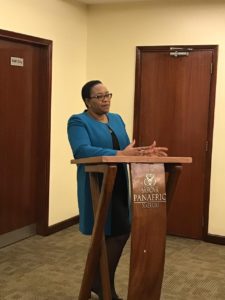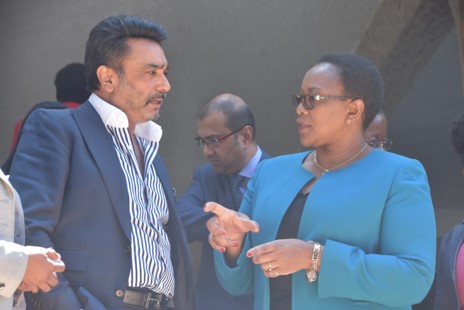Universal Health Coverage(UHC) Program Stakeholder Sensitization
The Ministry of Health(MoH) held a Universal Health Coverage(UHC) Program Stakeholder Sensitization meeting to Kenya Healthcare Federation(KHF) at Sarova PanAfric Hotel in Nairobi on 7th November 2018.The meeting was chaired by the Cabinet Secretary, Ministry of Health Mrs. Sicily Kariuki and co – chaired by Dr. Amit N. Thakker ,Chairman ,Kenya Healthcare Federation(KHF) In her opening remarks, Mrs. Kariuki thanked the private health sector team led by their chairman Dr. Amit N. Thakker for honoring the invitation to the meeting at such a short notice. In additional she expressed her gratitude for the fruitful partnership between Kenya Healthcare Federation and Ministry of Health.

The CS stated that the way to deliver UHC is through NHIF on a premium base. “This was the initial thinking. However, with time it has become clear that the UHC dream would not be implemented by 2022 as initially envisaged. This model highlighted challenges like the high cost involved in targeting vulnerable populations. The new approach to this was to balance political and practical implementation. As such, the government with technical advice from experts and in consultation with the county governments so it best fit to provide free healthcare services to its citizens via the county public health facilities.” Said Mrs.Sicily Kariuki, CS Ministry of Health.
The advantages of this new model includes: Strengthen community and public health systems, institutionalize a referral system and Utilize the resources available without causing further strain.The CS informed the inattendance that the pilot phase will still be in 4 counties which include Machakos, Kisumu, Isiolo and Nyeri. For a period of six months before scaling up. This pilot phase will help interrogate the institutional framework to deliver social protection through a health scheme. Some of the requirements prior to implementation includes: A legal and regulatory framework to deliver social protection through a health scheme,strengthen KEMSA to provide commodities and supplies to deliver UHC, a robust monitoring and evaluation framework, Customer care reference in terms of standards and redress mechanisms and a promotive preventive approach will help achieve a more economical viable solution.
It was reiterated that new model of implementing UHC was highly supported by the President, Governors and Parliament. The key focus on the new model will lie on offering promotive and preventive health services. “We need to strengthen Public Health Services, Community Health Services,and Health Systems to respond to the needs of the population and a continuum of care to offer basic and specialized services” Said Mrs.Sicily Kariuki, CS Ministry of Health. There was discussion around the funds available to implement the pilot phase of the UHC, Where It was reported that the allocation criteria was equitable based on: County population, equitable share of resources, poverty estimates, outpatient utilization rates, In-patient utilization rates, burden of disease, crude death rates, health facility density and Physical access to health facilities.
Dr. Amit N. Thakker, Chairman Kenya Healthcare Federation shared the federation’s position, which was in line with the affordable healthcare for all, as declared by H.E President Uhuru Kenyatta on 12th December 2017. He stated the private sector will fully support the UHC model. “Private sector is happy that MOH is accepting the reality around UHC implementation. The suppliers old debt at KEMSA should be paid and going forward, there should be: Prudent management of the funds, commend the stepwise approach safer and more sustainable and strengthen institutional capacity especially at the county level and county facilities. Private sector must operate in a sustainable way, even if the margins are small. They must be willing to give concessions to government on price.” Dr. Amit N. Thakker, Chairman, Kenya Healthcare Federation
Dr. Thakker emphasized on: Strengthening institutional capacity especially Supply chain – quality, Good Manufacturing Product(GMP) 10% preferential rate, KEMSA reforms especially in markups, unregulated parallel imports, counterfeit medicines and pricing regulations, Health services – support for higher levels of care by referral mechanism, preferential prices for public referrals, Financing – support innovative county schemes, support by insurers in claims and fraud management, technology support and Training and academia – HRH capacity, training in classrooms and practices in public sector facility. There was an agreement that KHF will present a position paper to the CS after consulting it’s membership.Major Discussions centred on: Role of private sector healthcare providers? It was agreed that the focus of the pilot phase would be in government facilities, where It was noted that there is a risk of patients overflow that would happen in the immediate period of declaring free health services in the four counties. However, Emergency care fund to cater for the costs incurred by private sector – this will be considered in the special fund that has been set aside to manage referrals of indigent populations for specialized care.

Regulations and reforms: it was noted that NHIF – this is in progress alongside that of KEMSA,on formation of the Kenya Food and Drug Authority – there was an update that discussions are being held in conjunction with the Ministry of Agriculture and relevant stakeholders will be involved, concerning supply chain on reimbursement framework for supply chain commodities, it was highlighted that intensive efforts are being put in place to strengthen KEMSA including their ability to supply commodities outside their framework. In additional to this questions around strengthening pharmaceutical services and assuring quality and addressing governance issues, price controls were discussed. They were deferred to the existing platform that is already handling the same. There were also discussions on provision of quality of healthcare. It was noted That UHC is not just about healthcare financing noting this, the private sector is willing to share best practices on the same.
Biometrics to identify recipients of the pilot phase and also to streamline electronic medical records was tackled this was brought to the attention of the attendees that there is a plan to register populations residing in the four pilot counties in order to contain the demand but also to be able to measure and evaluate progress. It was emphasized that this being a pilot phase, there was a lot of room for lessons learned and better positioning of the private sector in the scale up of UHC to the rest of the 43 counties.

hi everyone, my itemize is wiener and i honourable require to say that this is an fantabulous blog accumulation and i real recovered it utile, would it be alright if i submitted posts to this blog virtually topics i recovered newsworthy?